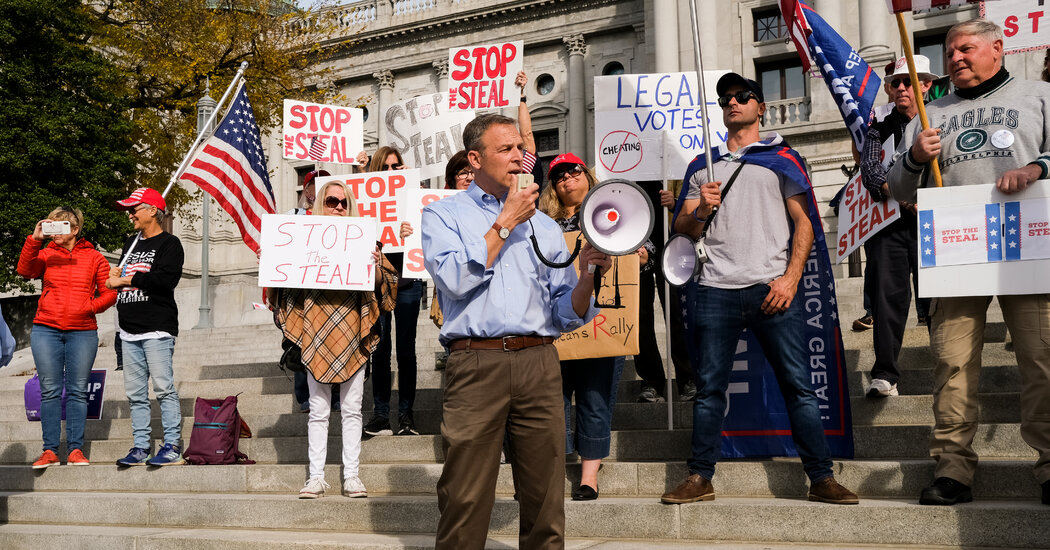
WASHINGTON — Representative Scott Perry, a Pennsylvania Republican closely involved in former President Donald J. Trump’s effort to overturn the 2020 election, said on Tuesday that he was refusing to meet with the House committee investigating the Jan. 6 attack on the Capitol, joining a small group of Mr. Trump’s allies who have stonewalled the panel.
Mr. Perry, the incoming chairman of the ultraconservative House Freedom Caucus, called the committee “illegitimate.”
“I decline this entity’s request and will continue to fight the failures of the radical Left who desperately seek distraction from their abject failures of crushing inflation, a humiliating surrender in Afghanistan, and the horrendous crisis they created at our border,” Mr. Perry wrote on Twitter.
The committee sent a letter on Monday seeking testimony and documents from Mr. Perry, the first public step the panel has taken to try to get information from any of the Republican members of Congress deeply involved in Mr. Trump’s effort to stay in power.
The committee asked Mr. Perry to meet with its investigators and voluntarily turn over all “relevant electronic or other communications” related to the buildup to Jan. 6, including his communications with Mr. Trump and his legal team as well as others involved in planning rallies on Jan. 6 and the objections in Congress to Joseph R. Biden Jr.’s victory.
Understand the U.S. Capitol Riot
On Jan. 6, 2021, a pro-Trump mob stormed the Capitol.
To date, the panel has been reluctant to issue subpoenas for information from sitting members of Congress, citing the deference and respect lawmakers in the chamber are supposed to show one another. But Representative Bennie Thompson, Democrat of Mississippi and the chairman of the panel, has pledged to take such a step if needed.
“Representative Perry has information directly relevant to our investigation,” said Tim Mulvey, a committee spokesman. “The select committee prefers to gather relevant evidence from members cooperatively, but if members with directly relevant information decline to cooperate and instead endeavor to cover up, the select committee will consider seeking such information using other tools.”
In refusing to meet with the committee, Mr. Perry joins a small number of witnesses who have not cooperated with the panel. More than 300 witnesses have met with investigators, most voluntarily without receiving a subpoena.
There have been consequences for those who refuse.
The House has voted twice to hold allies of Mr. Trump in criminal contempt of Congress, referring those cases to federal prosecutors. A grand jury indicted the former Trump adviser Stephen K. Bannon — facing charges that carry up to two years in jail and thousands in fines — while Mark Meadows, the former White House chief of staff, awaits a decision from federal prosecutors.
Mr. Meadows and Mr. Trump have sued to block the release of thousands of records, after the former president asserted executive privilege over a vast array of documents.
Some key witnesses have settled on the tactic of invoking their right against self-incrimination to avoid answering questions. Jeffrey Clark, a Justice Department lawyer who participated in Mr. Trump’s plans to overturn the election, has said he would invoke the Fifth Amendment in response to questions.
John Eastman, a lawyer who wrote a memo on how to overturn the election, also has cited the Fifth Amendment, and a third potential witness, the political operative Roger J. Stone Jr., invoked his right against self-incrimination last week to every question the committee asked.
Others interviewed by the committee have turned to the courts to block its subpoenas for data about their phone calls and text messages. Four witnesses who were involved in organizing the rally that preceded the violence — Justin Caporale, Maggie Mulvaney, Megan Powers and Tim Unes — filed suit against Verizon, trying to prevent the company from turning over cellphone data to the committee. Mr. Eastman also sued, claiming “a highly partisan” invasion of his privacy.
Key Figures in the Jan. 6 Inquiry
Ali Alexander, a conservative activist and rally organizer for the “Stop the Steal” movement who turned over thousands of pages of documents to the committee, accused the panel in a lawsuit of issuing “an unlawful and overbroad subpoena” that violated his rights to free speech and privacy.
In his suit, Mr. Alexander said he was in contact with Representatives Paul Gosar and Andy Biggs of Arizona and Mo Brooks of Alabama, all Republicans, in the buildup to Jan. 6.
“In January, Mr. Alexander held an organizing call where members of Congress might have been present, and some were invited,” Mr. Alexander’s suit states. “He doesn’t recall who was in attendance because there was no roll call of attendees because the call was so large.”
Mr. Perry joined Mr. Gosar, Mr. Biggs and Mr. Brooks in a campaign to fight the results of the election.
In the weeks after the election, Mr. Perry compiled a dossier of voter fraud allegations and coordinated a plan to try to replace the acting attorney general with Mr. Clark. Mr. Perry also introduced Mr. Trump to Mr. Clark and was communicating with Mr. Meadows via an encrypted app, Signal, the committee said.



